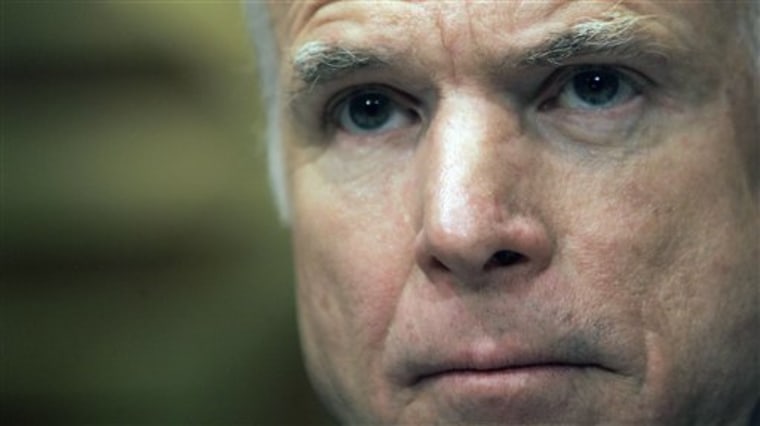With so much focus on the Democratic primary, it seems only appropriate to check in on how John McCain has been spending his time. At this point, we find a candidate who has not made the best use of a unique opportunity to define himself (and his opposition), especially on the economy, which is his weakest link and tops the list of voters' concerns.
The first thing McCain needed to do was unify the base. After all, even when the GOP primary was all but over, McCain was still unable to carry the white evangelical vote in states such as Texas. Since then, he's trotted out conservative standard-bearers, culminating with the endorsement of Nancy Reagan.
Even so, the latest Diageo/Hotline poll [PDF] showed that Republicans are less enthusiastic about supporting him than they were just a month ago.
In February [PDF], 50 percent of Republican primary voters said they'd support McCain "enthusiastically in November." In late March, just 38 percent said the same. Is it buyer's remorse? That seems unlikely, given that McCain's done nothing to aggravate the base. It's not like he's been taking a more active stance on immigration policy or campaign finance reform.
Maybe this is a sign that the more he stands alone, the less impressive he looks. When Republicans were forced to think about nominee McCain vs. nominee Mike Huckabee, McCain looked strongest.
Or is it simply a reflection of the general lack of enthusiasm Republicans have shown for this election? Perhaps. Interestingly enough, the Diageo/Hotline poll did show a slight uptick among GOP voters in terms of their optimism about retaining the White House this year. In the February poll, just 49 percent of Republicans thought the GOP nominee would have the "best chance" of winning in November. In March, that number went up to 53 percent. Even among independent voters, Republicans' chances improved from a weak 25 percent to a better, though still anemic, 35 percent.
Most important, McCain has the unique opportunity to reintroduce himself to voters while Democrats are caught up with their own internal battles. So how does he decide to do this in a year in which voters say they want change and a new direction? He launches a "biography tour" that treks through his past.
While there's little doubt that McCain's life story is powerful, this strategy seems out of step with the attitude of the electorate this year. Last November, according to an NBC News/Wall Street Journal poll, voters were evenly divided on the question of whether they'd prefer a president who is focused on "protecting what has made America great" or one who would "help move America forward." Last month, however, an NBC/WSJ poll [PDF] showed that 57 percent now want to focus on "moving forward" and just 39 percent want to focus on "protection."
The good news for McCain is that he starts with a reservoir of goodwill among independent voters. Unlike President Bush, McCain actually has a receptive (albeit skeptical) audience. That gives him an opportunity to frame his position on the economy before the Democrats do it for him. Instead, the GOP and McCain's camp seem more determined to debate whether McCain declared he'd have the U.S. spend "100 years" in Iraq.
Voters like McCain much more than they like a generic Republican candidate. Yet that support hasn't translated into a belief that he'll do a better job than Hillary Rodham Clinton or Barack Obama on the economy. In the Diageo/Hotline poll, just 33 percent of voters said the Republican Party would do a better job of handling the economy. When matched up against Clinton and Obama, just 35 percent of voters picked McCain as best able to manage the economy. How about trying a national "listening tour" on the economy, focused on states like New Hampshire or Ohio, where McCain could have an opportunity to really challenge Obama in November?
McCain and the GOP want to have a fight in November that centers around character and patriotism. But for voters who are desperately looking for a break from the campaign rhetoric of the last eight years and are struggling with a sagging economy, that won't be enough.
